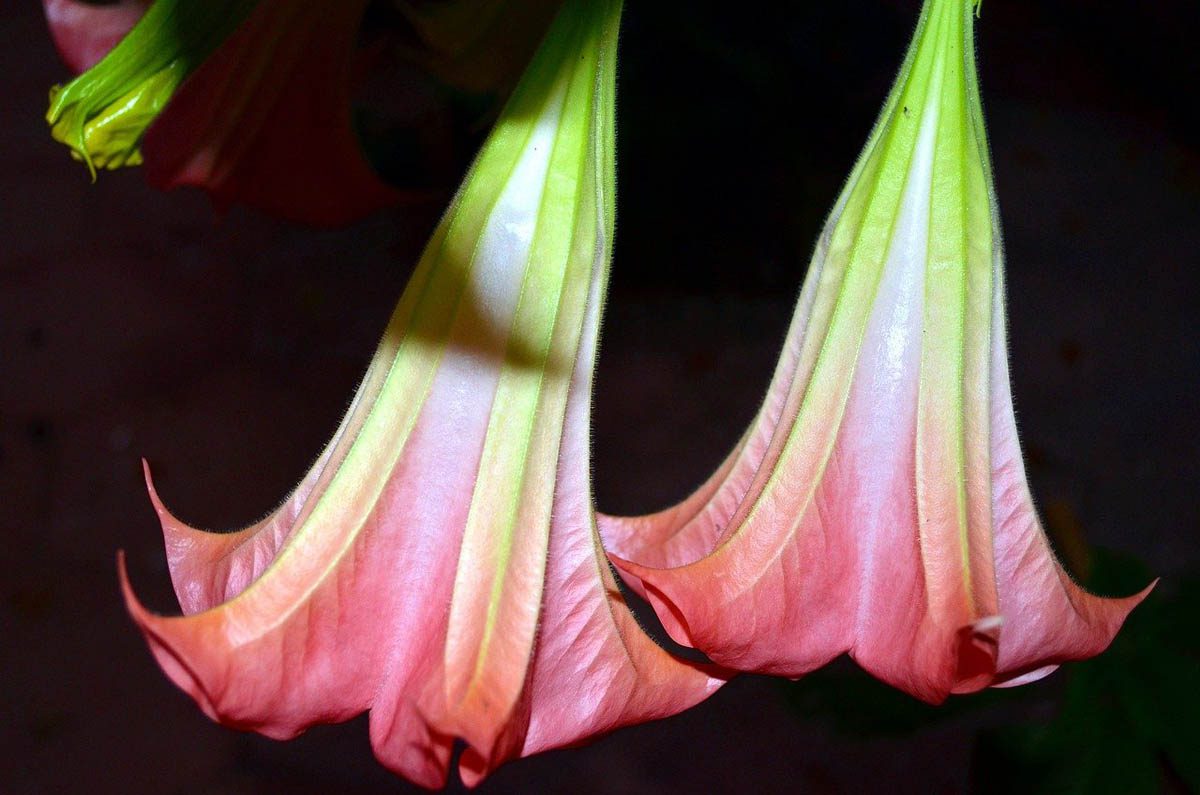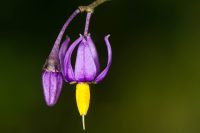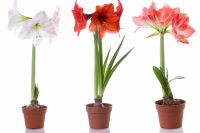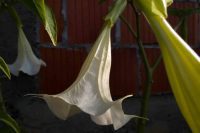Angel’s trumpet (Brugmansia spp.) is highly toxic to dogs. The toxic principles are tropane alkaloids including atropine, hyoscyamine and scopolamine. Tropane alkaloids are secondary metabolites mostly found in the Solanaceae family which have powerful powerful anticholinergic agents.
What is angel’s trumpet?
| Family | Solanaceae |
| Botanical name | Brugmansia spp. |
| Common names | Angel’s trumpet, Brugmansia, Trumpet of death |
| Leaf colour | Green |
| Flower colour | Yellow, salmon and white |
| Toxicity | Toxic to dogs |
| Toxic properties | Tropane alkaloids (atropine, hyoscyamine and scopolamine) |
| Toxic parts | All parts, the highest concentration in the seeds and roots |
What is angel’s trumpet?
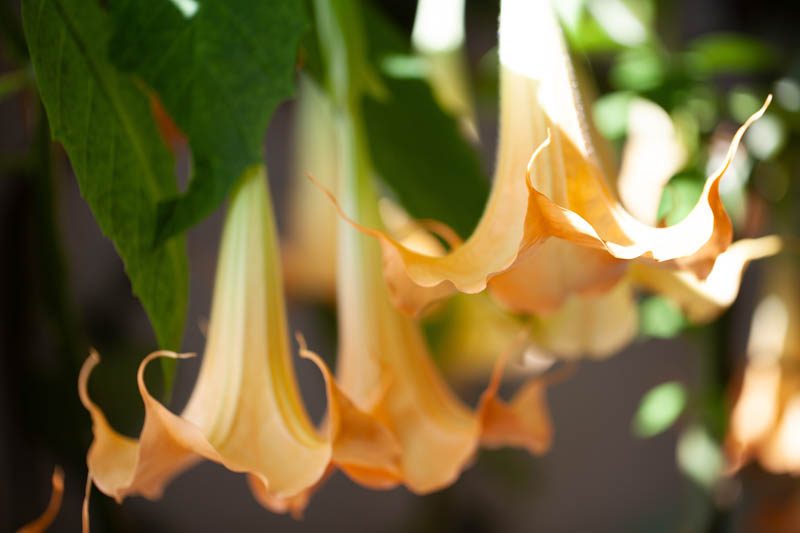
Angel’s trumpet (Brugmansia spp.) is a large shrub or small tree made up of 7-8 species native to tropical South America. The plant is grown for its distinctive and highly fragrant pendulous, trumpet-shaped flowers which reach a length of 15 – 20 cm long. Angel’s trumpet is widely cultivated in Western Europe, Southeastern United States, Australia and Asia. In cooler climates, angel’s trumpet may be grown in a pot and brought indoors during winter.
Angel’s trumpet is also used to describe Datura spp., a genus of nine species that are also members of the Solanaceae family. Also known as ‘Devil’s trumpet‘, Datura flowers have a similar appearance to Brugmansia flowers, however, Datura flowers point in an upward direction, unlike Brugmansia which points downward. Brugmansia leaves are oblong, while the leaf of Datura species is pinnately lobed.
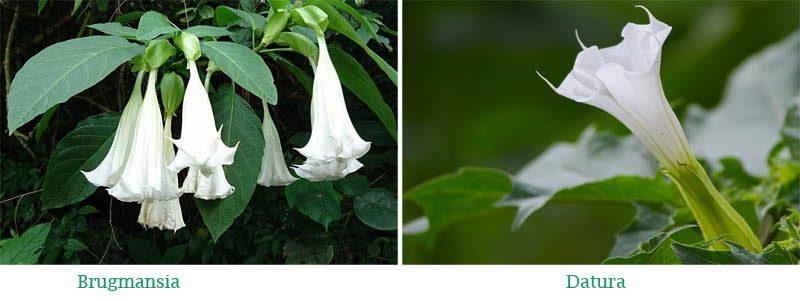
What are the toxic properties of angel’s trumpet?
The toxic properties are tropane alkaloids including atropine, hyoscyamine and scopolamine. The level of toxicity can vary depending on the part tested as well as the maturity of the plant.
Atropine, hyoscyamine and scopolamine are potent anticholinergic agents, blocking the action of the neurotransmitter acetylcholine. Acetylcholine the chief neurotransmitter of the parasympathetic system that dilates blood vessels, contracts smooth muscles, and slows the heart rate. Exposure to atropine, hyoscyamine and scopolamine can lead to anticholinergic toxidrome and confusion. The perfumed flowers may also cause respiratory problems in humans, but there is no data on the effects on dogs.
Angel’s trumpet is one of the most commonly abused plants due to its hallucinogenic effects, especially among the younger population.
The University of California has placed Angel’s trumpet in category 1.
- Major Toxicity: These plants may cause serious illness or death. If ingested, immediately call the Poison Control Center — (800) 222-1222 — or your doctor.
Gardeners should always wear gloves and protective eyewear when handling angel’s trumpet.
Clinical signs of angel’s trumpet poisoning
Symptoms of Angel’s trumpet develop rapidly after exposure, and may include:
- Dilated (enlarged) pupils
- Confusion
- Loss of appetite
- Decreased GI motility
- Constipation
- Tachycardia (rapid heart rate) followed by bradycardia (slow heart rate)
- Respiratory failure
- Urinary retention
- Convulsions
- Death
First aid
Remove as much plant matter from the dog’s mouth as possible. Due to the highly toxic nature of Angel’s trumpet, immediate veterinary treatment is critical.
What is the treatment for angel’s trumpet poisoning?
If ingestion was recent, the veterinarian will induce vomiting to remove any plant matter from the gastrointestinal tract, this will be followed by administration of activated charcoal to bind to any remaining plant matter.
Treatment is aimed at managing symptoms which may include intravenous fluids to prevent or treat dehydration and help to flush any remaining toxins out of the body via the urine. Antiemetics may be given to dogs who are experiencing unproductive vomiting. Dogs experiencing seizures will be administered anticonvulsants such as phenobarbital to control the abnormal electrical activity in the brain.
Cardiac monitoring will be performed during treatment to monitor the heart.
Prevention
The only way to prevent angel’s trumpet ingestion is to not grow it in homes with children or pets. The toxicity of plants can range from mild or insignificant to deadly, unfortunately, angel’s trumpet falls into the deadly category.
Julia is a writer and landscape consultant from Wollongong with a love of horticulture. She had been an avid gardener for over 30 years, collects rare variegated plants and is a home orchardist. Julia is passionate about learning and sharing her knowledge of plant propagation and plant toxicology. Whether it’s giving advice on landscape projects or sharing tips on growing, Julia enjoys helping people make their gardens flourish.
